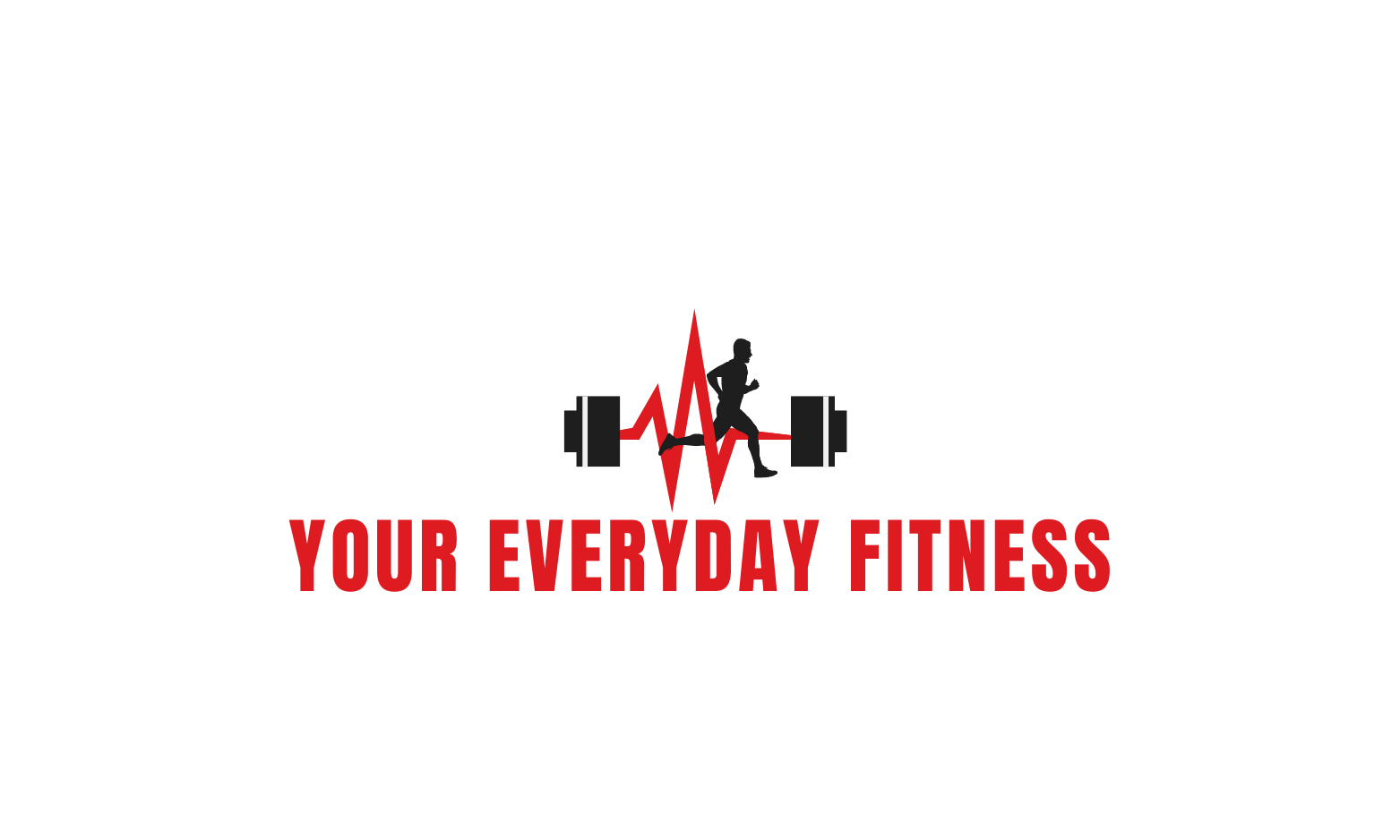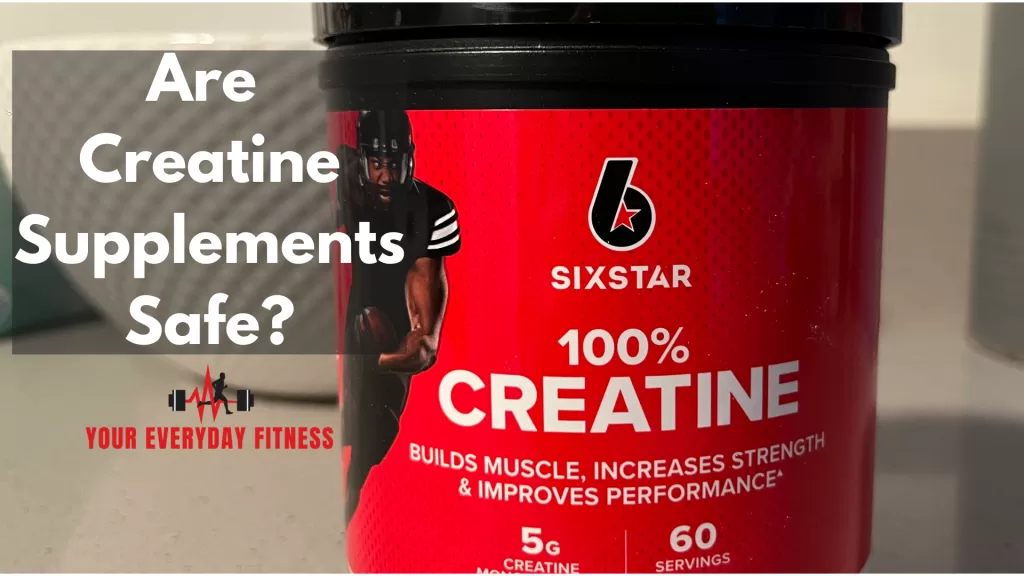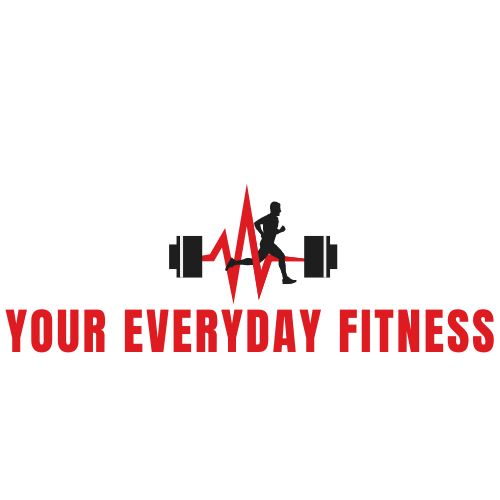Creatine is one of the most popular supplements in the world of fitness, especially in bodybuilding and athletics. Many people talk about all of the performance enhancing benefits of creatine, and how it can help you grow muscle, which is why so many athletes use it as a part of their routine. That being said, many people who are new to the supplement wonder: are creatine supplements safe?
It’s a fair question; all supplements should be debated, tested, and investigated, especially by those who are considering taking them! There are plenty of skeptics of creatine supplements who drive questions about the long term effects and side effects of the supplement, while others swear by its effectiveness and safety.
Since this supplement continues to get more and more popular each year, it is important to separate the facts from the fiction, and understand the reality of creatine supplementation.
In this article, we will discuss the safety of creatine in its entirety; it’s safety profile, its benefits, who should take it and who shouldn’t, etc. By the end you will have a complete answer to your question; are creatine supplements safe?
Understanding Creatine Supplements
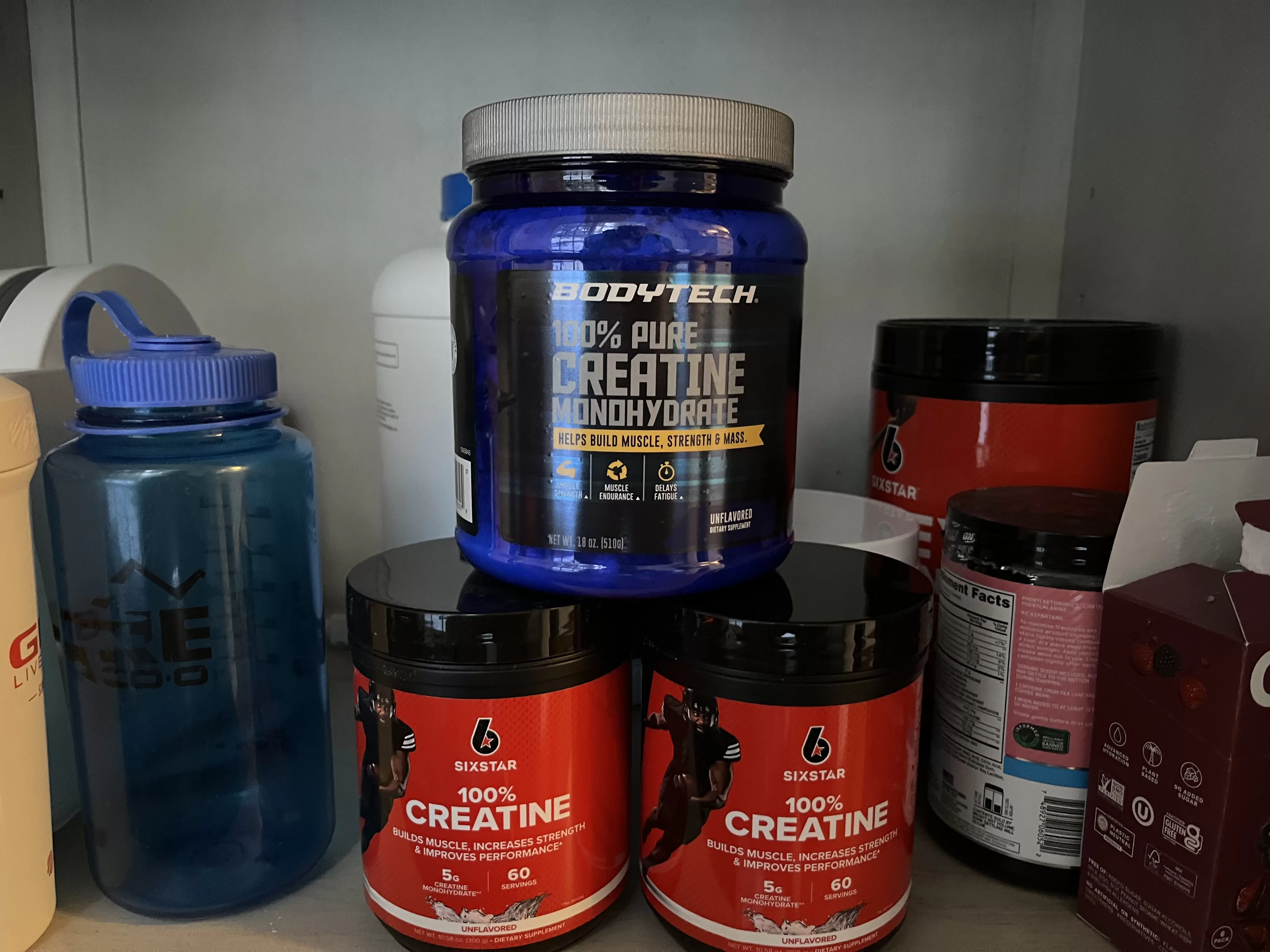
What is creatine?
Creatine is a compound that is produced naturally in our bodies, and can be found in many foods we eat.
Creatine plays a huge role in producing energy, especially during high intensity exercise like weightlifting, sports, sprinting, etc.. Creatine is composed of three amino acids: glycine, arginine, and methionine.
How creatine works in the body
So first of all, let’s go over how creatine works in the body, and how creatine is made. Creatine is like an energy reserve in our muscle cells, helping our bodies make more ATP, which is the energy currency of our cells.
This energy produced by creatine helps us in our intense activities, especially those that require short bursts of power and speed.
Here’s a breakdown of creatine’s effects:
- Increases phosphocreatine stores in muscles
- Improves ATP regeneration during intense exercise
- Speeds up muscle recovery between sets
- Helps with muscle growth and strength gains
Different forms of creatine supplements
There are many different kinds of creatine supplements.
- Creatine Monohydrate: The standard, most studied form. When most people think of creatine, they are thinking of monohydrate. Almost all the creatine supplements purchased by the regular athlete are monohydrate.
- Creatine Ethyl Ester: Claimed to have better absorption
- Creatine Hydrochloride: Purported to cause less bloating
- Buffered Creatine: Designed to be more stable in the stomach
- Liquid Creatine: Pre-mixed for convenience
Each type of creatine has its own benefits, but scientific studies continue to prove that creatine monohydrate is the most effective and safe form of creatine you can take.
I’d say for the large majority of users, stick to monohydrate, and don’t worry about the other kinds of creatine.
Safety Profile of Creatine
Creatine supplements are classified as dietary supplements in the United States, which means they are not subject to the same strict FDA approval process as prescription drugs.
This does not in anyway mean that creatine is unsafe, but the FDA regulates dietary supplements in a different way, still making sure that they are produced in a high-quality, properly labeled and advertised way.
Short-term side effects
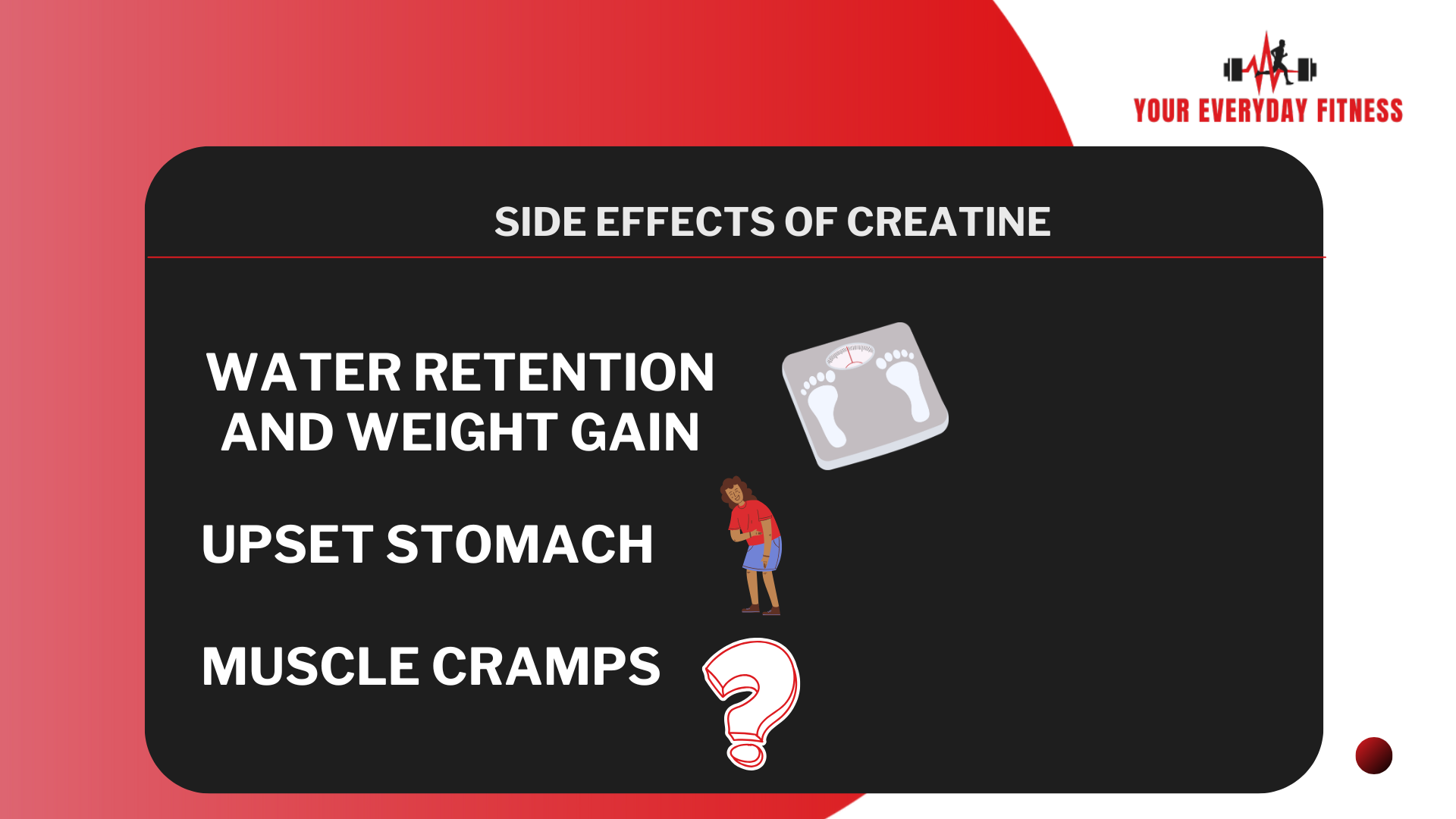
While creatine is generally considered safe, some users may experience minor short-term side effects:
- Water retention (weight gain)
- Bloating
- Gastrointestinal discomfort
- Muscle cramps
These effects are pretty mild and usually go away after a few days of supplementing with creatine once the body is adjusted.
Long-term safety considerations
Research on the long-term safety of creatine supplementation is very, very extensive, and quite reassuring.
There are studies that took place for over 5 years, and they have shown that there are not any significant negative effects on kidney or liver function in healthy individuals.
However, those with pre-existing kidney conditions should 100% consult a healthcare professional before using any creatine supplements.
Myths vs. facts about creatine safety
Several myths persist about creatine safety, but scientific evidence has proven many of them false:
- Myth: Creatine causes kidney damage
- Fact: Scientific studies have shown that kidney function has not been affected by creatine supplements, which have shown to be safe (Longobardi, Gualano, Seguro, Roschel. 2023).
- Myth: Creatine leads to dehydration
- Fact: May actually improve hydration levels, reduce the risk of dehydration, and help regulate body temperature (Cooper, Naclerio, Allgrove, Jimenez, 2021).
- Myth: Creatine causes hair loss
- Fact: There is no direct link that has been found in studies between creatine and hair loss (Antonio, Jose, et al., 2021).
Now that we have gotten those myths out of the way, let’s go over some of the benefits of creatine.
Benefits of Creatine Supplementation
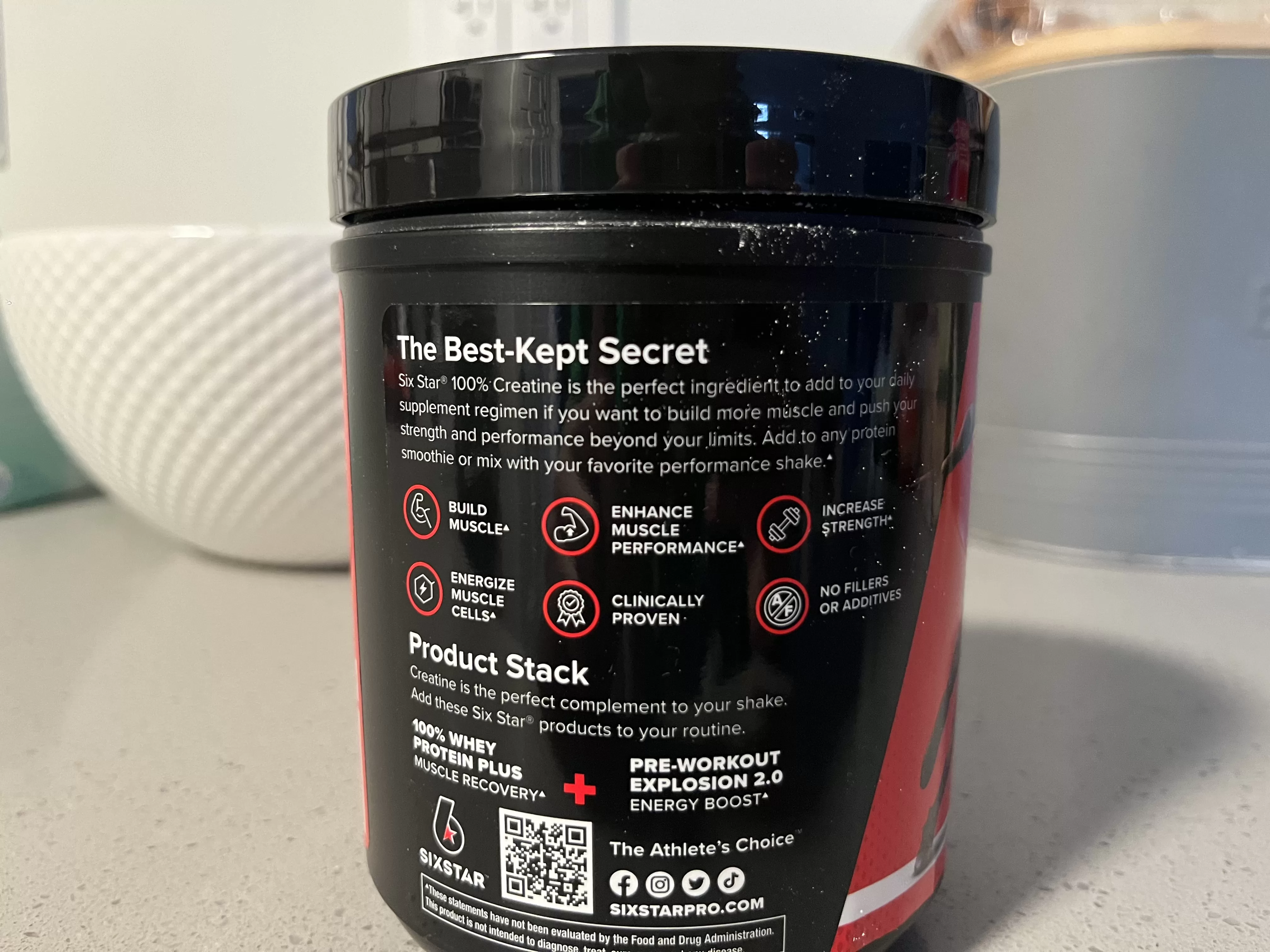
Improved athletic performance
Creatine supplementation has been studies for decades now, and all research hasd consistently shown that creatine improves:
- Short-duration, high-intensity exercises
- Power output during sprints
- Muscle recovery between workout sessions
Muscle growth and strength gains
Creatine is also known for its ability to grow muscle and strength, which is why it is taken by every single bodybuilder, powerlifter, and olympic lifter. It does this because it:
- Increases water retention in the muscles
- Enhances protein synthesis
- Reduces muscle breakdown
Cognitive function enhancement
More recently, studies have shown that there are cognitive benefits of creatine as well, including:
- Improved memory and mental processing
- Enhanced focus and concentration
- Potential neuroprotective effects
Potential therapeutic applications
Emerging research suggests potential therapeutic applications in:
- Neurodegenerative disorders (e.g., Parkinson’s disease)
- Muscular dystrophies
- Depression and mood disorders
- Traumatic brain injury recovery
The wide variety of benefits from creatine show why it is so popular. It’s really important to know that the benefits and risk of creatine also depend on the person taking it. Let’s go a little deeper into the precautions you should take before taking creatine supplements.
Potential Risks and Precautions
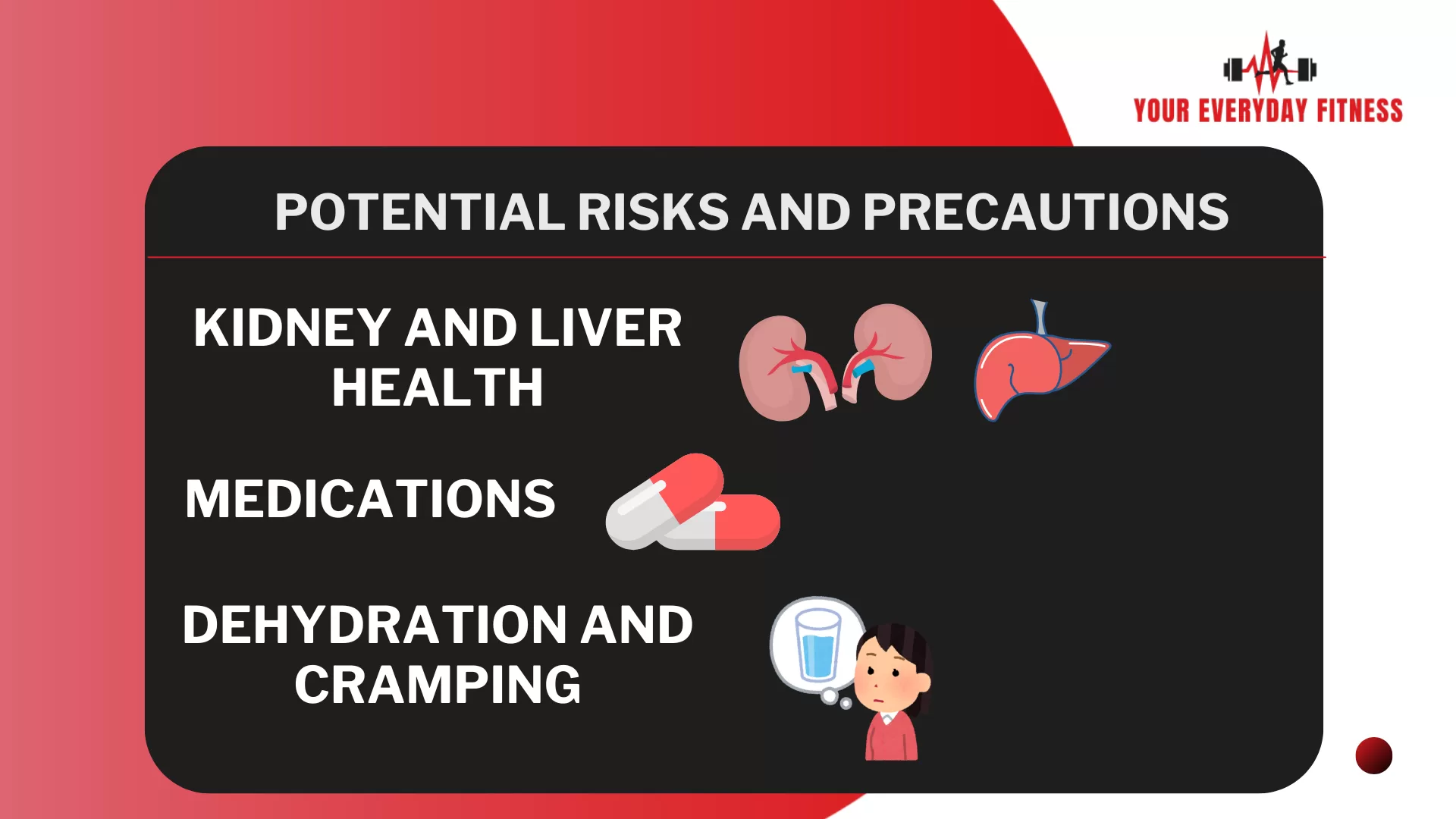
Kidney and liver health concerns
While creatine is generally considered safe for most people, and research on creatine and kidney function, as well as on liver function has shown no adverse effects of creatine for healthy individuals, some people may need to still take precautions.
Those with pre-existing kidney and liver conditions should consult with a healthcare professional before taking creatine.
It’s important to note that individuals with pre-existing kidney or liver conditions should consult a healthcare professional before using creatine supplements. This is because creatine is metabolized by the kidneys and the excess must be filtered out which can be an added burden on the kidneys.
The liver also helps convert creatine into its usable form and any dysfunction could mess up this process, leading to liver complications.
Therefore, it’s important to get professional guidance to make sure that the use of creatine does not adversely affect your health.
Dehydration and cramping
Some users report muscle cramps or dehydration when taking creatine.
To avoid these issues:
- Drink more water! (and electrolytes)
- Avoid excessive dosages of creatine each day
- Gradually introduce creatine to your system, don’t start taking loads all at once
Interactions with medications
Creatine may interact with certain medications, including:
- NSAIDs (e.g., ibuprofen)
- Diuretics
- Caffeine
Always consult with a healthcare provider before starting creatine supplementation if you’re taking any medications. This is extremely important!
Recommended dosages and cycling
To maximize the benefits and minimize the potential risks of creatine, follow this dosing plan which has proven to be successful.
- Start with a loading phase: 20g/day for 5-7 days
- Maintenance phase: 3-5g/day
- Consider cycling: 8-12 weeks on, followed by 4 weeks off
If you would like to, you can skip the loading phase, and just go directly to the maintenance phase. This has been shown to be just as effective, it just takes a little longer to reap the benefits of creatine.
Following the recommended dosages and considering cycling can help you make sure that you are safely taking creatine.
Who Should (and Shouldn’t) Take Creatine Supplements

Athletes and bodybuilders
Athletes and bodybuilders are at the top of the list when it comes to who should take creatine, and I don’t need to tell them this because all of them already take it!
It is a no-brainer for these individuals, as they are looking to improve performance, muscle mass, and strength.
The improved power output during exercise is a huge boost for athletes and competitive bodybuilders, as well as the improved recovery which helps them keep their high volume without getting overly fatigued or injured.
Older adults
Creatine supplementation can offer a lot of benefits for older adults, especially with helping them maintain muscle mass and strength as they age.
Some benefits of creatine for older adults include:
- Improved bone density
- Enhanced cognitive function
- Increased muscle strength and power
Vegetarians and vegans
Vegetarians and vegans may especially benefit from creatine supplements as their diets naturally lack creatine-rich foods (red meat, fish, etc.).
Supplementation can help vegetarians and vegans:
- Bridge nutritional gaps in plant-based diets
- Improve exercise performance
- Support cognitive function
People with pre-existing health conditions
While creatine is safe for the large majority of people, individuals with certain health conditions should proceed with caution.
It’s very, very important to consult a healthcare professional before starting supplementation, especially for those with:
- Kidney disorders
- Liver diseases
- High blood pressure
That being said, people with certain medical conditions may actually benefit from creatine supplementation under medical supervision, such as those with:
- Muscular dystrophy
- Parkinson’s disease
- Certain types of heart conditions
Wrapping it Up: Are Creatine Supplements Safe?
Creatine supplements have proven to be a safe and effective supplement for almost all individuals when used properly.
Creatine supplements enhance athletic performance, muscle mass, and cognitive function which makes them a great choice for athletes and gym-goers.
That being said, it is very important to be aware of the potential side effects and follow recommended dosages.
Always consult with a healthcare professional before starting with creatine supplementation if you are unsure if it is right for you, especially if you have pre-existing health conditions or take medications.
As with any supplement, responsible use and awareness of your own body are the keys to getting all of the benefits while minimizing any risks associated with creatine supplementation.
References
- Buford, Thomas W., et al. “International Society of Sports Nutrition Position Stand: Creatine Supplementation and Exercise.” Journal of the International Society of Sports Nutrition, vol. 4, no. 1, 2007, p. 6.
- Kreider, Richard B., et al. “International Society of Sports Nutrition Position Stand: Safety and Efficacy of Creatine Supplementation in Exercise, Sport, and Medicine.” Journal of the International Society of Sports Nutrition, vol. 14, no. 1, 2017, p. 18.
- Antonio, Jose, et al. “Common Questions and Misconceptions about Creatine Supplementation: What Does the Scientific Evidence Really Show?” Journal of the International Society of Sports Nutrition, vol. 18, no. 1, 2021, p. 13.
- Forbes, Scott C., et al. “Effects of Creatine Supplementation on Brain Function and Health.” Nutrients, vol. 14, no. 4, 2022, p. 921.
- Avgerinos, Konstantinos I., et al. “Effects of Creatine Supplementation on Cognitive Function of Healthy Individuals: A Systematic Review of Randomized Controlled Trials.” Experimental Gerontology, vol. 108, 2018, pp. 166–173.
- Gualano, Bruno, et al. “Creatine Supplementation in the Aging Population: Effects on Skeletal Muscle, Bone and Brain.” Amino Acids, vol. 48, no. 8, 2016, pp. 1793–1805.
- Rawson, Eric S., and Andrew C. Venezia. “Use of Creatine in the Elderly and Evidence for Effects on Cognitive Function in Young and Old.” Amino Acids, vol. 40, no. 5, 2011, pp. 1349–1362.
- Dolci, Alessandro, et al. “Safety and Efficacy of Creatine Supplementation in Children and Adolescents: A Systematic Review.” British Journal of Sports Medicine, vol. 45, no. 5, 2011, pp. 411–415.
- Brosnan, John T., and Margaret E. Brosnan. “The Role of Dietary Creatine.” Amino Acids, vol. 48, no. 8, 2016, pp. 1785–1791.
- Persky, Adam M., and Jay R. Brazeau. “Clinical Pharmacology of the Dietary Supplement Creatine Monohydrate.” Pharmacological Reviews, vol. 53, no. 2, 2001, pp. 161–176.
- Longobardi I, Gualano B, Seguro AC, Roschel H. Is It Time for a Requiem for Creatine Supplementation-Induced Kidney Failure? A Narrative Review. Nutrients. 2023 Mar 18;15(6):1466. doi: 10.3390/nu15061466. PMID: 36986197; PMCID: PMC10054094.
- Cooper R, Naclerio F, Allgrove J, Jimenez A. Creatine supplementation with specific view to exercise/sports performance: an update. J Int Soc Sports Nutr. 2012 Jul 20;9(1):33. doi: 10.1186/1550-2783-9-33. PMID: 22817979; PMCID: PMC3407788.
